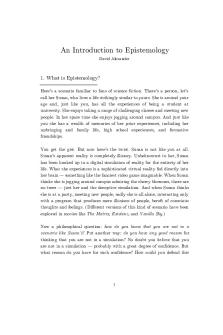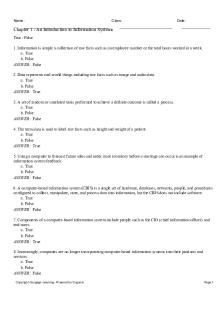Chapter 1 - Vocabulary (An Introduction to Dynamic Business Law) PDF

| Title | Chapter 1 - Vocabulary (An Introduction to Dynamic Business Law) |
|---|---|
| Author | Rene Barajas |
| Course | Business Law 1 |
| Institution | Florida Atlantic University |
| Pages | 3 |
| File Size | 121.8 KB |
| File Type | |
| Total Downloads | 55 |
| Total Views | 155 |
Summary
Vocabulary Definitions from Chapter 1 of Dynamic Business Law 5th Edition...
Description
Business law consists of the enforceable rules of conduct that govern commercial relationships. For example, a firm is required by law to obey the antitrust laws when it considers merging with another firm. Private law regulates disputes between private individuals or groups. If a store owner is delinquent in paying rent to the landlord, the resulting dispute is governed by private law. Public law controls disputes between private individuals or groups and their government. If a store dumps waste behind its building in violation of local, state, or federal environmental regulations, public law will resolve the dispute. Civil law lays out the rights and responsibilities implied in relationships between persons and between persons and their government. It also identifies the remedies available when someone’s rights are violated. Criminal law, in contrast, regulates situations in which someone commits an act against the public as a whole, such as by conducting insider trading on the stock exchange.
constitutional law refers to the general limits and powers of these governments as stated in their written constitutions. assortment of statutes, or rules and regulations put forth by legislatures, is what we call statutory law.
uniform law A law created to account for the variability of laws among states; serves to standardize the otherwise different interstate laws. Also called model law. Case law, also called common law, is the collection of legal interpretations made by judges. These interpretations are law unless revoked later by new statutory law. precedent, past decisions in similar cases that guide later decisions, When courts rely on precedent, they are obeying the principle of stare decisis (“standing by their decision”), in which rulings made in higher courts become binding precedent for lower courts. Restatements of the Law. These are summaries of the common law rules in a particular area of the law that have been enacted by most states. The American Law Institute prepares these Restatements for contracts, agency, property, torts, and many other areas of law that affect business decisions. While the Restatements are not themselves a direct source of business law, judges frequently use them to guide their interpretations in a particular case. Administrative law is the collection of rules and decisions made by a huge number of administrative agencies. natural law describes certain ethical laws and principles believed to be morally right and “above” the laws devised by humans. Under natural law, individuals have not only basic human rights but also the freedom to disobey a law enacted by people if their conscience goes against it and they believe it is wrong. legal positivism sees our proper role as obedience to duly authorized law. That law is quite distinct from morality, and moral questions about the law should not interfere with our inclination to obey it. Closely linked to pursuing legal change through natural law is pursuing change through identification with the vulnerable, on the grounds that some higher law or body of moral principles connects all of us in the human community. Some members of our society are able to take care of themselves in terms of most life situations. Others, especially the ill, children, the aged, the disabled, and the poor, require assistance to meet their fundamental needs of life, health, and education Legal realism is based on the idea that, when ruling on a case, judges need to consider more than just the law; they also weigh factors such as social and economic conditions, since legal guidelines were designed by humans and exist in an ever-changing environment. Judges who follow this school of thought are more likely to depart from past court decisions to account for the fact that our society is constantly shifting and evolving. They believe the law can never be enforced with complete consistency and argue that because judges are human, they will bring different methods of reasoning to very similar cases cost-benefit analysis An economic school of jurisprudence in which all costs and benefits of a law are given monetary values. Those laws with the highest ratios of benefits to costs are then preferable to those with lower ratios.
Tort - a wrongful act or an infringement of a right (other than under contract) leading to civil legal liability....
Similar Free PDFs

1. An Introduction to Epistemology
- 10 Pages

1. An Introduction to Glaciers
- 6 Pages
Popular Institutions
- Tinajero National High School - Annex
- Politeknik Caltex Riau
- Yokohama City University
- SGT University
- University of Al-Qadisiyah
- Divine Word College of Vigan
- Techniek College Rotterdam
- Universidade de Santiago
- Universiti Teknologi MARA Cawangan Johor Kampus Pasir Gudang
- Poltekkes Kemenkes Yogyakarta
- Baguio City National High School
- Colegio san marcos
- preparatoria uno
- Centro de Bachillerato Tecnológico Industrial y de Servicios No. 107
- Dalian Maritime University
- Quang Trung Secondary School
- Colegio Tecnológico en Informática
- Corporación Regional de Educación Superior
- Grupo CEDVA
- Dar Al Uloom University
- Centro de Estudios Preuniversitarios de la Universidad Nacional de Ingeniería
- 上智大学
- Aakash International School, Nuna Majara
- San Felipe Neri Catholic School
- Kang Chiao International School - New Taipei City
- Misamis Occidental National High School
- Institución Educativa Escuela Normal Juan Ladrilleros
- Kolehiyo ng Pantukan
- Batanes State College
- Instituto Continental
- Sekolah Menengah Kejuruan Kesehatan Kaltara (Tarakan)
- Colegio de La Inmaculada Concepcion - Cebu













